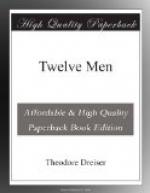“Oh,” said the doctor, idly and jestingly, “I think I’d cut it off.”
“Yes,” said the man, very much pleased with this free advice, “with what, Doctor?”
“Oh, I think I’d use a pair of scissors,” he replied amusedly, scarcely assuming that his jesting would be taken seriously.
The driver jogged on and the doctor did not see or hear of him again until some two months later when, meeting him in the street, the driver smilingly approached him and enthusiastically exclaimed:
“Well, Doc, you see I cut ’er off, and she got well!”
“Yes,” replied the doctor solemnly, not remembering anything about the case but willing to appear interested, “—what was it you cut off?”
“Why, that sore on my ear up here, you know. You told me to cut it off, and I did.”
“Yes,” said the doctor, becoming curious and a little amazed, “with what?”
“Why, with a pair of scissors, Doc, just like you said.”
The doctor stared at him, the whole thing coming gradually back to him.
“But didn’t you have some trouble in cutting it off?” he inquired, in disturbed astonishment.
“No, no,” said the driver, “I made ’em sharp, all right. I spent two days whettin’ ’em up, and Bob Hart cut ’er off fer me. They cut, all right, but I tell you she hurt when she went through the gristle.”
He smiled in pleased remembrance of his surgical operation, and the doctor smiled also, but, according to his daughter, he decided to give no more idle advice of that kind.
In the school which I attended for a period were two of his sons, Fred and Walter. Both were very fond of birds, and kept a number of one kind or another about their home—not in cages, as some might, but inveigled and trained as pets, and living in the various open bird-houses fixed about the yard on poles. The doctor himself was intensely fond of these and all other birds, and, according to his daughter and his sons, always anticipated the spring return of many of diem—black-birds, blue jays, wrens and robins—with a hopeful, “Well, now, they’ll soon be here again.” During the summer, according to her, he was always an interested spectator of their gyrations in the air, and when evening would come was never so happy as when standing and staring at them gathering from all directions to their roosts in the trees or the birdhouses. Similarly, when the fall approached and they would begin their long flight Southward, he would sometimes stand and scan the sky and trees in vain for a final glimpse of his feathered friends, and when in the gathering darkness they were no longer to be seen would turn away toward the house, saying sadly to his daughter:
“Well, Dollie, the blackbirds are all gone. I am sorry. I like to see them, and I am always sorry to lose them, and sorry to know that winter is coming.”
“Usually about the 25th or 26th of December,” his daughter once quaintly added to me, “he would note that the days were beginning to get longer, and cheer up, as spring was certain to follow soon and bring them all back again.”




